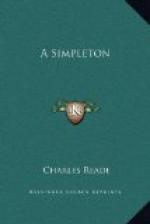The wedding-day was named. The bridesmaids were selected, the guests invited. None refused but Uncle Philip. He declined, in his fine bold hand, to countenance in person an act of folly he disapproved. Christopher put his letter away with a momentary sigh, and would not show it Rosa. All other letters they read together, charming pastime of that happy period. Presents poured in. Silver teapots, coffeepots, sugar-basins, cream-jugs, fruit-dishes, silver-gilt inkstands, albums, photograph-books, little candlesticks, choice little services of china, shell salt-cellars in a case lined with maroon velvet; a Bible, superb in binding and clasps, and everything but the text—that was illegible; a silk scarf from Benares; a gold chain from Delhi, six feet long or nearly; a Maltese necklace, a ditto in exquisite filagree from Genoa; English brooches, a trifle too big and brainless; apostle spoons; a treble-lined parasol with ivory stick and handle; an ivory card-case, richly carved; workbox of sandal-wood and ivory, etc. Mr. Lusignan’s City friends, as usual with these gentlemen, sent the most valuable things. Every day one or two packages were delivered, and, in opening them, Rosa invariably uttered a peculiar scream of delight, and her father put his fingers in his ears; yet there was music in this very scream, if he would only have listened to it candidly, instead of fixing his mind on his vague theory of screams—so formed was she to please the ear as well as the eye.
At last came a parcel she opened and stared at, smiling and coloring like a rose, but did not scream, being too dumfounded and perplexed; for lo! a teapot of some base material, but simple and elegant in form, being an exact reproduction of a melon; and inside this teapot a canvas bag containing ten guineas in silver, and a wash-leather bag containing twenty guineas in gold, and a slip of paper, which Rosa, being now half recovered from her stupefaction, read out to her father and Dr. Staines:
“People that buy presents blindfold give duplicates and triplicates; and men seldom choose to a woman’s taste; so be pleased to accept the enclosed tea-leaves, and buy for yourself. The teapot you can put on the hob, for it is nickel.”
Rosa looked sore puzzled again. “Papa,” said she, timidly, “have we any friend that is—a little—deranged?”
“A lot.”
“Oh, then, that accounts.”
“Why no, love,” said Christopher. “I have heard of much learning making a man mad, but never of much good sense.”
“What! Do you call this sensible?”
“Don’t you?”
“I’ll read it again,” said Rosa. “Well—yes—I declare—it is not so mad as I thought; but it is very eccentric.”
Lusignan suggested there was nothing so eccentric as common sense, especially in time of wedding. “This,” said he, “comes from the City. It is a friend of mine, some old fox; he is throwing dust in your eyes with his reasons; his real reason was that his time is money; it would have cost the old rogue a hundred pounds’ worth of time—you know the City, Christopher—to go out and choose the girl a present; so he has sent his clerk out with a check to buy a pewter teapot, and fill it with specie.”




